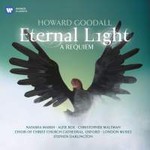
Howard Goodall: Eternal Light - A Requiem
 $27.00
Special Order
$27.00
Special Order3 - 6 weeks add to cart
HOWARD GOODALL
Howard Goodall: Eternal Light - A Requiem
Natasha Marsh, Alfie Boe (tenor) & Christopher Maltman / London Musici & Christ Church Cathedral Choir, Oxford, Stephen Darlington
[ Warner Classics / CD ]
Release Date: Monday 22 September 2008
This item is only available to us via Special Order. We should be able to get it to you in 3 - 6 weeks from when you order it.
Warner Classics is proud to release Eternal Light: A Requiem, a new work by the award-winning British composer and internationally acclaimed broadcaster, Howard Goodall. Goodall's unusual setting of the liturgical service is performed by Christ Church Cathedral Choir, Oxford and London Musici conducted by Stephen Darlington with soloists Natasha Marsh, Alfie Boe and Christopher Maltman.
The writing of a Requiem is a special challenge for any composer. The great Requiems of the past by composers such as Mozart, Verdi, Fauré and Duruflé interpret the sacred Requiem text literally, and represent a prayer for the salvation of the departed soul(s). Howard Goodall's Requiem, by contrast, is intended to provide solace to the grieving. The composer said, "For me, a modern Requiem is one that acknowledges the terrible, unbearable loss and emptiness that accompanies the death of loved ones, a loss that is not easily ameliorated with platitudes about the joy awaiting us in the afterlife. … Musical expression can I hope provide some outlet, some reflection, some transportation, even some comfort….This was to be a Requiem for the living, a Requiem focussing on interrupted lives."
Eternal Light: A Requiem is also distinguished by the inclusion of English poetry, mixed with fragments of Latin, sung simultaneously or antiphonally between the soloists and the choir. Goodall explains, "One section of Latin text comes not from the Requiem mass but from the Book of Revelation, with its description of the coming of the Angels of the Apocalypse. The Recordare movement combines with Phineas Fletcher's early-17th century sacred verse Drop, drop, slow tears. Other texts are drawn from John McCrae, Francis Quarles, Mary Elizabeth Frye and Ann Thorp."
Commissioned by Mark Stephenson on behalf of London Musici to celebrate the orchestra's 20th anniversary, Eternal Light: A Requiem is a stand-alone choral work that will have its London premiere in November 2008 in an exciting collaborative version for choir, soloists, orchestra and dance. The dance, Eternal Light, commissioned by Sadler's Wells Theatre, will be performed by Rambert Dance Company, its associate orchestra London Musici and Christ Church Cathedral Choir, Oxford. Rambert Dance Company and its artistic director, Mark Baldwin, worked closely with Howard Goodall from the conception of the project to find ways in which the themes of the Requiem might be explored further in dance.
The result of this collaboration is a work that should appeal to a broad-based audience. Following the premiere, Rambert Dance Company will tour Eternal Light nationally across the UK. Over seventy dates have already been confirmed, including the London premiere, which will take place at Sadler's Wells on Armistice Day (November 11), the 90th anniversary of the end of World War I.
And, as the composer said recently, "although it was not deliberately conceived thus, it is powerfully appropriate that the central Dies Irae movement takes as its vision of hell the horror of armed conflict. Alongside the Latin text phrases I have juxtaposed John McCrae's haunting war poem In Flanders Fields. McCrae, a Canadian military doctor of great distinction, died on the Western Front in January 1918."
Three other choral works by Howard Goodall are also included in this CD: his setting of Psalm 23, well known as the them tune of the BBC's Vicar of Dibley series; Love Divine, a hymn of praise set to Charles Wesley's reassuring, open-hearted words; and, finally, Goodall's setting of Spared, Wendy Cope's poem capturing the feelings of many people following the destruction of the World Trade Center in New York on September 11, 2001. "[The work] acts, I hope, as a fitting companion to Eternal Light: A Requiem."
"(The Requiem) has a cumulative impact, I find, especially from the fourth movement onwards. The sixth movement, in which the poem 'In Flanders Fields' is combined with phrases from the Dies Irae is powerfully effective. By contrast, the relative simplicity of the 'Agnus Dei' movement is winning, as is the affecting baritone solo in the fifth movement, and Goodall knits the threads of the work together convincingly in the tenth and final movement." MusicWeb